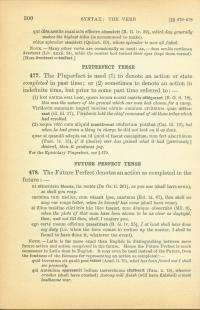The Pluperfect
477. The pluperfect is used (1) to denote an action or state completed in past time; or (2) sometimes to denote an action in indefinite time, but prior to some past time referred to.
(1) Locī nātūra erat haec, quem locum nostrī castrīs dēlēgerant. (B. G. 2.18)
This was the nature of the ground which our men had chosen for a camp.
Viridovīx summam imperī tenēbat eārum omnium cīvitātum quae dēfēcerant. (id. 3.17)
Viridovix held the chief command of all those tribes which had revolted.
(2) Neque vērō cum aliquid mandāveratcōnfectum putābat. (Cat. 3.16)
But when he had given a thing in charge he did not look on it as done.
Quae sī quandō adepta est id quod eī fuerat concupītum, tum fert alacritātem (Tusc. 4.15)
If it (desire) ever has gained what it had [previously] desired, then it produces joy.
For the Epistolary Pluperfect, see § 479.
The Future Perfect
478. The future perfect denotes an action as completed in the future.
Ut sēmentem fēceris, ita metēs. (De Or. 2.261)
As you sow (shall have sown), so shall you reap.
Carmina tum melius, cum vēneritipse, canēmus. (Ecl. 9.67)
Then shall we sing our songs better, when he himself has come (shall have come).
Sī illīus īnsidiae clāriōrēs hāc lūce fuerint, tum dēnique obsecrābō. (Mil. 6)
When the plots of that man have been shown to be as clear as daylight, then, and not till then, shall I conjure you.
Ego certē meum officium praestiterō. (B. G. 4.25)
I at least shall have done my duty (i.e. when the time comes to reckon up the matter, I shall be found to have done it, whatever the event).
Note— Latin is far more exact than English in distinguishing between mere future action and action completed in the future. Hence the future perfect is much commoner in Latin than in English. It may even be used instead of the future, from the fondness of the Romans for representing an action as completed.
Quid inventum sit paulō post vīderō. (Acad. 2.76)
What has been found out I shall see presently.
Quī Antōnium oppresserit bellum taeterrimum cōnfēcerit. (Fam. 10.19)
Whoever crushes (shall have crushed) Antony will finish (will have finished) a most loathsome war.

